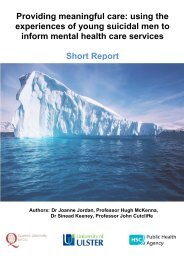Saving Mothers' Lives: - Public Health Agency for Northern Ireland
Saving Mothers' Lives: - Public Health Agency for Northern Ireland
Saving Mothers' Lives: - Public Health Agency for Northern Ireland
You also want an ePaper? Increase the reach of your titles
YUMPU automatically turns print PDFs into web optimized ePapers that Google loves.
Professional accountability and competence<br />
In the majority of cases where the woman had a new or underlying medical or psychological problem,<br />
appropriate referrals <strong>for</strong> medical opinion were made. However, in many of these cases the midwives<br />
involved then appeared to consider that they had done enough and believed the woman was no longer<br />
their responsibility. On the other hand, some midwives were worried that their concerns were being ignored<br />
by medical staff. For example:<br />
An older parous woman who was obese, smoked, had a long gap since her last pregnancy and<br />
a blood pressure (BP) of 150/89 mm/Hg was booked <strong>for</strong> midwifery led care. She presented with<br />
severe headaches and vomiting near term which required opiates <strong>for</strong> relief. On admission her<br />
midwife was unhappy with the junior doctor’s lack of concern but “resigned herself to the fact that<br />
he knew best”. A subarachnoid haemorrhage was eventually diagnosed but she deteriorated and<br />
died a few days later.<br />
This case illustrates an important point raised in many other cases as well. It is important that midwives<br />
should always seek a consultant opinion, and if necessary second consultant opinion, if they have<br />
continuing concerns about a woman in their care. If a midwife is still concerned following discussion with<br />
a medical consultant, support can be sought from a supervisor of midwives and the midwifery manager.<br />
Midwives have a duty of care <strong>for</strong> women, even when the pregnancy deviates from normal. This is<br />
reiterated by the Nursing and Midwifery Council, which states:<br />
“You are personally accountable <strong>for</strong> your practice. This means that you are answerable <strong>for</strong> your<br />
actions and omissions, regardless of advice or directions from another professional 7 ”.<br />
Midwifery Learning Point<br />
If a midwife remains worried following a medical opinion, s/he should have no qualms about contacting<br />
relevant senior medical personnel directly, such as the obstetric consultant on call. The Supervisor of<br />
Midwives is available <strong>for</strong> support and advice.<br />
Midwives are also responsible <strong>for</strong> ensuring they are competent in their own practice and should highlight<br />
any perceived training needs during their supervisory reviews. This should be recorded <strong>for</strong> future<br />
reference. In some cases there were issues around midwives failing to recognise common, non-pregnancy<br />
related medical conditions, and/or failing to appreciate the severity of others. There were a worrying<br />
number of cases where, despite obvious symptoms, basic observations such as temperature, pulse and<br />
blood pressure were not taken, or ignored. In some cases, these simple measures would have alerted the<br />
midwife to more sinister pathology. For example:<br />
A woman with a family history of hypertension had a BP of 140/90 mm/Hg at term. She had a<br />
straight-<strong>for</strong>ward birth but complained of a severe headache a few days after birth. Despite the<br />
continuation and severity of the headache, the midwife did not check her BP or refer her <strong>for</strong> medical<br />
opinion. The woman collapsed and died of a subarachnoid haemorrhage a few days later.<br />
Another woman was transferred home a few hours after a straight-<strong>for</strong>ward birth with a transient<br />
pyrexia, tachycardia and low BP which were recorded in the hospital notes but not recorded on<br />
the discharge summary. The fi rst community midwifery visit was two days later when the midwife<br />
did not take the woman’s temperature or record her pulse rate. The midwife also failed to realise<br />
the signifi cance of a sore throat and red area on the woman’s abdomen, despite the woman<br />
saying she felt “feverish”. The midwife did not plan to visit <strong>for</strong> a further four days; the woman died<br />
from septic shock in the meantime.<br />
203



